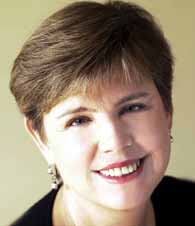|
Executive Interviews: Interview with Sally Helgesen on 21st Century Organization
December 2007
-
By Dr. Nagendra V Chowdary
 Sally Helgesen
Sally Helgesen Internationally acclaimed Author, Speaker, and Leadership Development Consultant. 
Women today have more
opportunities than ever, to pursue
desired life goals. Yet, we see many of
them walk away from their dreams.
When women enter the professional
arena or start families, they are often
forced to see that "ambition and
passion for recognition" is
unwomanly. Do women lack
ambition? (Many also associate
ambition with egotismor selfishness).
How can women become ambitious
about ambition including
cultivating connections with people,
who have the power to advance their
work and publicly praise their
successes?
|
|
I find that many women are
uncomfortable articulating their
strengths and that this stands in their
way. In addition, organizations have
become increasingly unbalanced in
terms ofwhat they expect frompeople
because of technological and
economic forces. This is ironic, since
it has happened at the same time that
women have entered the workforce
and begun to assume positions of
power and influence. Organizations
need to deal with this environment in
amuch better way, since its not going
away and people cannot be expected to
exhaust themselves on an ongoing
basis in order to make a living or
achieve some success. Many approaches have been
suggested to get rid of gender
inequality. However, most of them
seem to address the symptoms, rather
than the sources. What do you think
are the best ways to address the
sources of gender inequality? What
can be the steps to root out sources
discrimination and score possible
wins on this front?
I think the issues are primarily
cultural, and so are different in
different parts of the world and in
different kinds of organizations.
Obviously, legal impediments
(prohibitions of women inheriting
property, domestic violence and
sexual harassment being tolerated
etc.) are the key to start the process.
But in many cultures there is also a
long tradition of women being
considered flighty, not as smart, etc.,
an attitude that many women have
internalized and that many men
unconsciously assume. At an adult
level, programs can help women to
understand and articulate their
strengths. But hope for the future lies
in providing excellent education for
girls. I am very hopeful about the future!
1.
Human Resource and Organization Behavior Case Studies
2. ICMR
Case Collection
3.
Case Study Volumes
|
The Interview was conducted by Dr. Nagendra V Chowdary, Consulting Editor, Effective
Executive and Dean, IBSCDC, Hyderabad. This Interview was originally published in Effective Executive, IUP, December 2007. Copyright © December 2007, IBSCDC
No part of this publication may be copied, reproduced or distributed, stored in a retrieval
system, used in a spreadsheet, or transmitted in any form or medium electronic,
mechanical, photocopying, recording, or otherwise without the permission of IBSCDC. |
